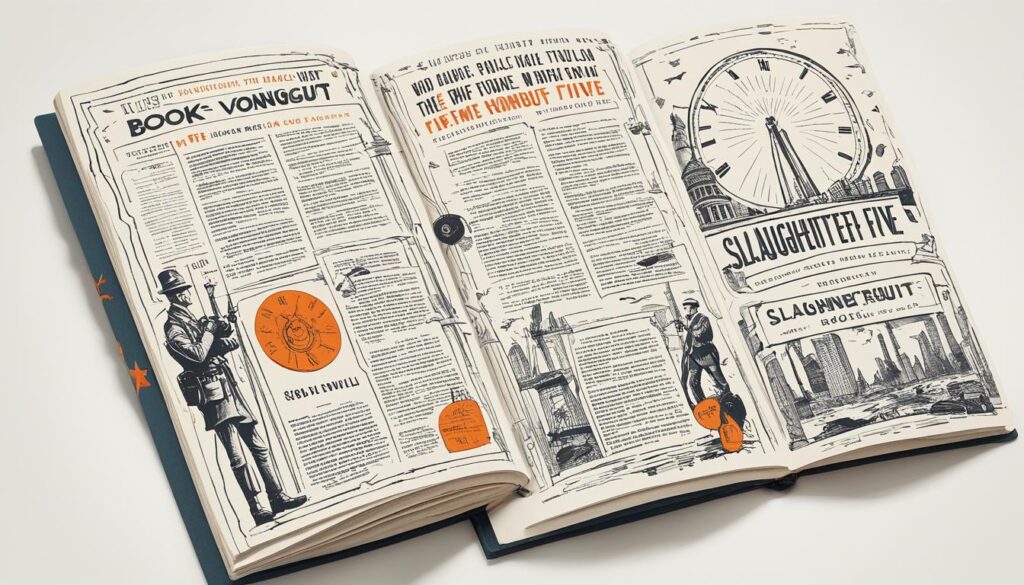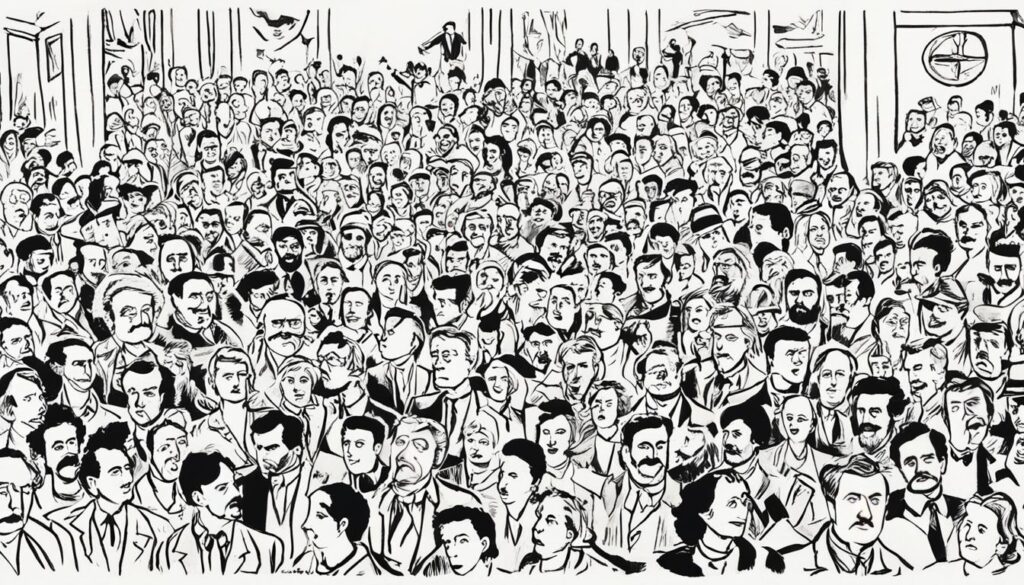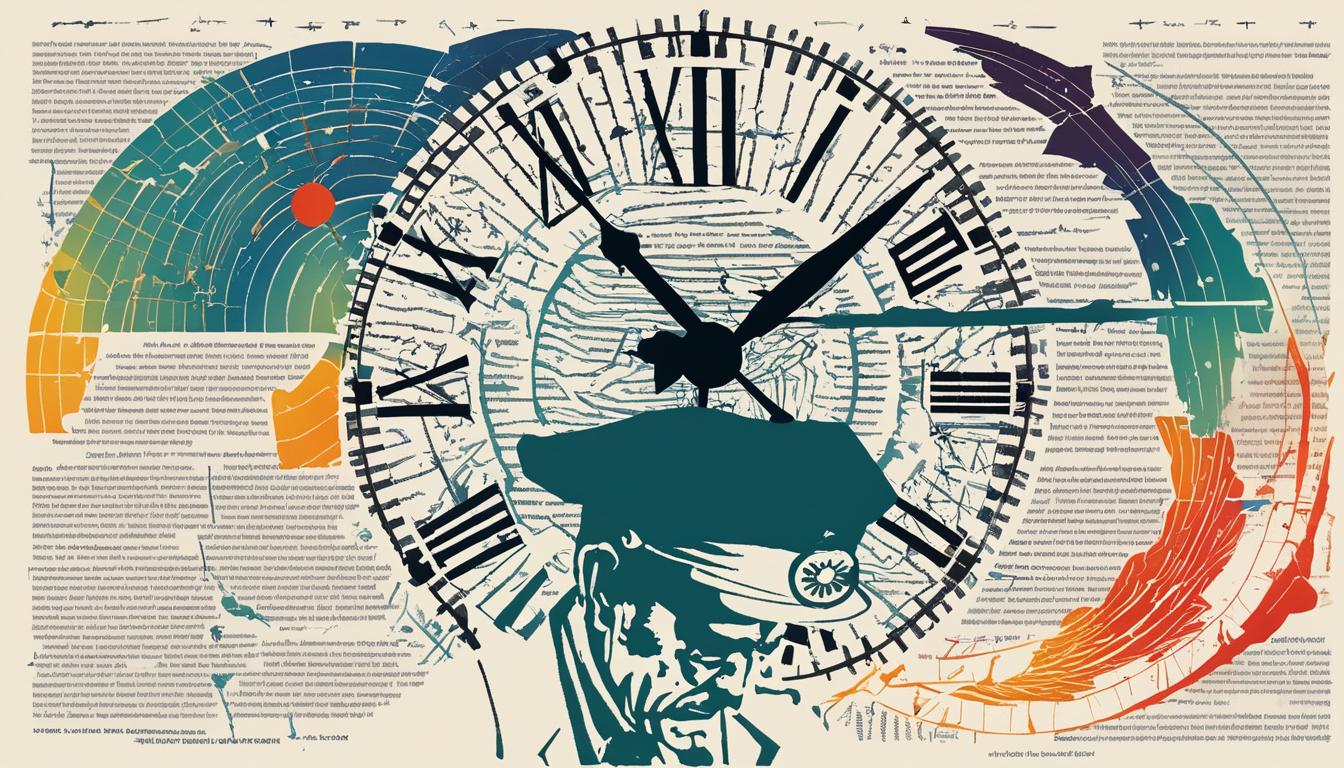If you are a fan of Kurt Vonnegut’s literary works, you must be familiar with his most acclaimed novel, ‘Slaughterhouse-Five’. This anti-war book portrays the experiences of the protagonist Billy Pilgrim and captures the horrors of World War II. It’s a deeply engrossing story that showcases Vonnegut’s writing prowess, and now, thanks to the audiobook format, you can immerse yourself in the magic of his words in a whole new way.
In this audiobook review, we explore the timeless narrative of Slaughterhouse-Five and delve into the depths of this literary masterpiece. Join us as we take a deep dive into the book and highlight everything you need to know about listening to its audiobook version.
This audiobook review addresses the narration and performance, character development, storytelling techniques, themes, historical significance, literary analysis, recommendations, and audience reception of the Slaughterhouse-Five audiobook. So, let’s get started!
About the Author
Kurt Vonnegut was an American writer, born on November 11, 1922, in Indianapolis, Indiana. His literary career spanned over five decades, during which he authored several literary works, including novels, short stories, and plays. Vonnegut served in the US Army during World War II, which inspired his critically acclaimed novel “Slaughterhouse-Five.”
Throughout his career, Vonnegut’s works often explored themes of war, the human condition, and social criticism, laced with absurdist humor. His writing style featured short, concise sentences with a conversational tone, making his work accessible to readers of diverse backgrounds.
Aside from “Slaughterhouse-Five,” Vonnegut’s other notable works include “Cat’s Cradle,” “Breakfast of Champions,” and “Sirens of Titan,” among others. He received numerous literary honors, including the National Book Award, the PEN Center USA Lifetime Achievement Award, and induction into the American Academy of Arts and Letters.
“I want to stand as close to the edge as I can without going over. Out on the edge you see all the kinds of things you can’t see from the center.”
Overview of “Slaughterhouse-Five”
“Slaughterhouse-Five” is a seminal work of modern American literature written by Kurt Vonnegut, published in 1969. The novel follows the life of Billy Pilgrim, a World War II veteran who becomes “unstuck in time” and experiences various moments of his life in a non-chronological order. The book explores themes of war, time, fate, and the human condition, all while weaving a captivating narrative that keeps readers engaged throughout. The story takes place in various settings, including war-torn Europe and the fictional Tralfamadorian planet.
The novel is widely regarded as a masterpiece and has been recognized with numerous awards and accolades. It has been adapted into different forms of media, including a film adaptation and an audiobook version. The literary legacy of “Slaughterhouse-Five” is still prevalent today, with the novel often being studied and discussed in academic circles. The novel’s historical significance can be attributed to its portrayal of World War II and its aftermath, providing a unique perspective on the war experience through the lens of Billy Pilgrim..
The plot is a deep reflection of what war does to people and how it affects their mentality. The character development is robust as the reader gets a deeper understanding of the characters’ backgrounds and how it influences their decisions. Vonnegut’s storytelling technique is unique, with a structure that isn’t in chronological order but manages to deliver the story effectively. Additionally, the book uses humor to dive into the dark themes it presents, which sets it apart from other novels in the war genre. Overall, “Slaughterhouse-Five” is a timeless work that continues to captivate readers and spark cultural discussions today.
The Audiobook Format
If you’re an avid reader, you might be wondering why you should choose the audiobook format of “Slaughterhouse-Five” by Kurt Vonnegut. Firstly, audiobooks offer a hands-free experience, allowing you to listen while you drive, exercise, or relax. It also enhances the immersive quality of the novel as you are transported into the story through expert narration.
Moreover, the audiobook format of “Slaughterhouse-Five” offers a unique experience with its rich audio effects, music, and character voices. The audiobook version includes an introduction by Vonnegut though it was recorded before his death in 2007. With audiobooks, you can interpret the text through a different lens and appreciate the nuances of the work in a new way.
If you’re looking for an engaging and convenient way to experience “Slaughterhouse-Five,” the audiobook format is a great option.
Narration and Performance
The audiobook of “Slaughterhouse-Five” offers a unique listening experience, enhanced by the skilled narration of James Franco. Franco brings Vonnegut’s characters and themes to life through his engaging delivery and dynamic range of voice inflections.
Franco’s performance captures the essence of the novel’s dark humor and poignant moments, creating an immersive experience that transports listeners into Vonnegut’s world. He masterfully portrays the various characters, including the protagonist Billy Pilgrim and the extraterrestrial Tralfamadorians, with distinctive voices and tones.
The narration is paced appropriately, allowing the story to unfold in a clear and concise manner. Franco’s talent elevates the audiobook format, making it a compelling choice for fans of the novel and newcomers alike.
“James Franco’s reading of “Slaughterhouse-Five” is pitch perfect. He captures Vonnegut’s comic yet poignant voice and delivers it with an effortless ease that keeps the listener engaged from beginning to end.”
Audiobook Narration and Performance Analysis
| Aspect | Observation |
|---|---|
| Voice inflection | Dynamic range; captures humor and poignancy |
| Character portrayal | Distinctive voices and tones |
| Pacing | Appropriate pace for clear and concise storytelling |
| Engagement | Compelling choice for fans and newcomers alike |
Overall, the narration and performance of the “Slaughterhouse-Five” audiobook add a new dimension to the novel, enhancing the reading experience and captivating listeners.
Engaging Storytelling
Kurt Vonnegut’s “Slaughterhouse-Five” is a masterclass in storytelling. The narrative structure and devices used by Vonnegut are both unique and captivating, making this a literary masterpiece that has stood the test of time.
Vonnegut employs a non-linear style of storytelling that jumps backwards and forwards in time, highlighting the chaotic nature of war and the human experience. He also uses metafictional devices, such as addressing the reader directly and breaking the fourth wall, creating a sense of intimacy and interactivity with the audience.
The most prominent device in “Slaughterhouse-Five” is its use of Tralfamadorian philosophy, which allows the protagonist, Billy Pilgrim, to experience time in a non-linear way. This adds a surreal element to the narrative, as Billy is able to see his entire life at once, including his traumatic experiences during World War II.
“The most important thing I learned on Tralfamadore was that when a person dies he only appears to die. He is still very much alive in the past, so it is very silly for people to cry at his funeral. All moments, past, present, and future, always have existed, always will exist.”
Vonnegut’s use of short, punchy sentences and dark humor also add to the power of the storytelling. The writing is both evocative and engaging, leaving a lasting impression on the reader.
The storytelling techniques used in “Slaughterhouse-Five” have influenced countless other works and cemented Vonnegut’s legacy as one of the greatest American authors of the 20th century.
Character Development
“Slaughterhouse-Five” by Kurt Vonnegut is a novel that explores the human condition through its vivid and complex characters. The protagonist, Billy Pilgrim, is a memorable character whose experiences during World War II and his subsequent abduction by aliens cause him to become “unstuck in time.” This condition presents many unique opportunities for character development as Billy navigates his way through time, space, and his own mind.
The other characters in the novel, such as the Tralfamadorians and the prisoners of war, also undergo significant growth and change throughout the story. Through Vonnegut’s masterful storytelling, each character is given a unique voice and perspective that adds depth and richness to the narrative.
| Character | Development |
|---|---|
| Billy Pilgrim | Billy’s experiences throughout the novel lead to a significant change in his character. He begins as a naive and optimistic young soldier and ends up as a broken and traumatized old man. His travels through time and space give him a unique perspective on the world that causes him to question everything he once believed. |
| Roland Weary | Weary is initially presented as a cruel and bullying soldier who eventually dies alone in the snow. However, in death, his body becomes a symbol of the senselessness of war. |
| Paul Lazzaro | Paul Lazzaro is a fierce and vengeful man who seeks retribution against Billy for the death of his friend, Weary. However, in the end, he is unable to carry out his plans and is left with a sense of emptiness. |
The intricate character development in “Slaughterhouse-Five” is a testament to Vonnegut’s skill as a writer. He expertly weaves together the experiences, relationships, and emotions of each character to create a tapestry of humanity that is both beautiful and tragic.
Themes Explored
In “Slaughterhouse-Five,” Kurt Vonnegut brilliantly explores the themes of war, time, fate, and the human condition, leaving a profound impact on readers across generations. The novel offers a unique perspective on the destructive nature of warfare and the futility of conflicts, questioning the very purpose of human existence. Through the character of Billy Pilgrim, Vonnegut presents a non-linear representation of time, highlighting the arbitrary nature of past, present, and future. The theme of fate runs throughout the book, as it depicts how individuals have little control over their destinies. Lastly, “Slaughterhouse-Five” portrays the complexity of the human condition, its vulnerability, and the profound impact of traumatic experiences, ultimately making it a timeless piece of literature that inspires introspection and reflection.
“All moments, past, present, and future, always have existed, always will exist. The Tralfamadorians can look at all the different moments just the way we can look at a stretch of the Rocky Mountains, for instance. They can see how permanent all the moments are, and they can look at any moment that interests them. It is just an illusion we have here on Earth that one moment follows another one, like beads on a string, and that once a moment is gone it is gone forever.” – Kurt Vonnegut, Slaughterhouse-Five
Historical Significance
Kurt Vonnegut’s “Slaughterhouse-Five” is a book of great historical significance, shedding light on the atrocities and aftermath of World War II through a unique and thought-provoking lens. In the wake of the war, the novel’s protagonist, Billy Pilgrim, develops a skewed sense of time, constantly shifting between moments of his life, including his harrowing experiences as a soldier and prisoner of war.
Through his depiction of Billy’s struggles, Vonnegut addresses the psychological and emotional toll of war, revealing the lasting impact on survivors and society at large. The novel’s anti-war message carries with it a powerful statement about the consequences of unchecked aggression and the importance of striving for peace.
Moreover, “Slaughterhouse-Five” was one of the first literary works to bring the reality of war to the forefront of American public consciousness. Its frank and honest portrayal of the horrors of combat and its effects on soldiers and civilians alike challenged traditional notions of heroism and patriotism, paving the way for a new wave of wartime literature.

“All this happened, more or less. The war parts, anyway, are pretty much true.” – Kurt Vonnegut, Slaughterhouse-Five
The Dresden Bombings
One of the most significant events in the novel is the bombing of Dresden, which was based on Vonnegut’s own experiences as a prisoner of war. The destruction of this culturally rich city, which claimed the lives of as many as 25,000 people, was a turning point in the war and a controversial chapter in American military history. Vonnegut’s portrayal of the bombings and their aftermath is a critique of war as a whole and highlights the devastating impact on both sides of the conflict.
Literary Analysis and Critique
Kurt Vonnegut’s “Slaughterhouse-Five” has received critical acclaim for its unique narrative technique and exploration of complex themes. The novel’s non-linear structure, reflective of the protagonist’s experience of time, has been widely praised by literary analysts for its experimental approach to storytelling.
The use of dark humor and satire throughout the novel also aids in its effective critique of war and the human condition. By incorporating anachronistic elements and melding science fiction with realism, Vonnegut creates a thought-provoking and profound work of literature.
“All this happened, more or less. The war parts, anyway, are pretty much true. One guy I knew really was shot in Dresden for taking a teapot that wasn’t his. Another guy I knew really did threaten to have his personal enemies killed by hired gunmen after the war. And so on. I’ve changed all the names.”
Despite its success, “Slaughterhouse-Five” has not been without its critics. Some argue that the novel’s unconventional structure and portrayal of war are confusing and fragmented, making it difficult for readers to fully engage with the story. However, the majority of literary analysts and readers alike consider “Slaughterhouse-Five” a masterpiece of modern American literature.
Impact and Legacy
Since its publication in 1969, “Slaughterhouse-Five” has left an indelible mark on literature and pop culture, becoming a beloved classic and inspiring countless adaptations and discussions. The novel’s impact and legacy extend far beyond its initial reception, continuing to captivate and challenge audiences to this day.
One of the most significant impacts of “Slaughterhouse-Five” lies in its approach to storytelling, with Vonnegut’s nonlinear and fragmented narrative structure serving as a hallmark of postmodern literature. The novel’s themes of war, trauma, and the human condition also continue to resonate with readers, with its commentary on the destructiveness of war remaining highly relevant in contemporary society.
“Slaughterhouse-Five” has also informed and influenced subsequent works in various mediums, including film, television, and music. For example, Billy Pilgrim’s time-shifting abilities have been echoed in films such as “Eternal Sunshine of the Spotless Mind” and “The Butterfly Effect,” while the novel’s brutal depiction of war has been referenced in songs by artists such as David Bowie and Bob Dylan.
Overall, “Slaughterhouse-Five” remains a powerful reminder of the enduring impact that literature can have on individuals and society as a whole, standing as a testament to Vonnegut’s literary genius and legacy.
Audiobook Recommendations
If you enjoyed listening to “Slaughterhouse-Five” on audiobook, here are some other recommendations to add to your listening list:
- “Catch-22” by Joseph Heller – Another classic anti-war satire that examines the absurdity of military bureaucracy and the effect of war on the human psyche.
- “The Time Traveler’s Wife” by Audrey Niffenegger – This unconventional love story follows the lives of a time-traveling man and his wife as they navigate the challenges and consequences of their unique situation.
- “The Underground Railroad” by Colson Whitehead – Winner of the 2017 Pulitzer Prize for Fiction, this gripping novel follows the harrowing journey of a young slave woman as she escapes to freedom on the Underground Railroad.
Expand your audiobook horizons with these captivating and thought-provoking titles.
Audience Reception
The audiobook version of “Slaughterhouse-Five” has garnered widespread critical acclaim and a positive response from general readers. The narration and performance of the audiobook have been praised for capturing the essence of Kurt Vonnegut’s literary style and evoking the emotions and themes of the novel.
Many readers have expressed their appreciation for the engaging storytelling and the unique blend of sci-fi, war, and personal reflection that defines “Slaughterhouse-Five.” The novel’s exploration of the human condition and the effects of war is especially poignant in the audiobook format, allowing listeners to immerse themselves in the narrative and experience its impact firsthand.
Overall, the audience reception of the “Slaughterhouse-Five” audiobook underscores the enduring appeal of this literary masterpiece and the power of its storytelling to resonate with readers across generations.

Conclusion
Overall, the audiobook version of “Slaughterhouse-Five” by Kurt Vonnegut is a must-listen for literary enthusiasts and general readers alike. The captivating storytelling techniques, complex characters, and significant themes explored make for an unforgettable listening experience.
The audiobook format offers unique advantages such as the convenience of listening while on the go and the added layer of performance. The narration and performance by the voice actor are top-notch, perfectly capturing the essence of the story and its characters.
Through “Slaughterhouse-Five,” Kurt Vonnegut created a literary masterpiece that has stood the test of time and will continue to impact readers and writers for generations to come. The audiobook version of this novel does justice to its legacy, providing a fresh perspective on a timeless classic.
If you are a fan of “Slaughterhouse-Five,” we recommend checking out other audiobooks that explore similar themes or employ similar writing styles. And for those who have yet to listen to this audiobook, we highly recommend giving it a chance.
In conclusion, this audiobook review of “Slaughterhouse-Five” offers an in-depth analysis of the various aspects of the novel and its audiobook format. We hope it has provided valuable insights for those who are curious about this literary masterpiece and its audio adaptation.



